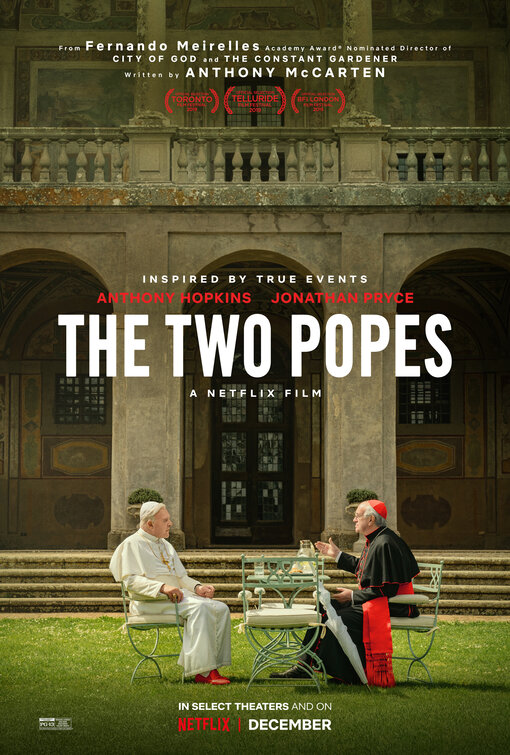Christians are likely to come away from The Two Popes with two reactions : The Catholic Church finally sold out its dogma, or the Church is finally finding its compass in a world wrought with change and conflict. The filmmakers clearly land on the side of a progressive Church, one that changes with the realities of contemporary times while trying to avoid compromising on its theology. But getting to this place at the end of this drama is not an easy journey.
The Two Popes is a strong, well executed drama that takes its subject and the Catholic Church seriously with Oscar worthy performances. Anthony Hopkins plays Cardinal Joseph Ratzinger, a doctrinal traditionalist, elected pope after the death of Pope John Paul II. In the Catholic Church, about 120 cardinals are selected from among more than 5,000 bishops. These cardinals have the responsibility for electing a new pope once the position becomes vacant. Bishops serve in a variety of leadership positions in the Church around the world, but only a few serve as cardinals. While some, including Ratzinger, are located in Rome, the vast majority serve dioceses and congregations around the globe.
As a cardinal and bishop, Ratzinger is a strong proponent of taking the Church back to fundamentals. He argues that the weakening of doctrine is one of the primary reasons for the Catholic Church’s decline across the globe. In opposition to Ratzinger’s call are more progressive bishops who believe doctrine and Church policy need to be updated. Argentine Cardinal and Archbishop Jorge Mario Bergoglio (Jonathan Pryce) is among this group. Bergoglio is a Latin American priest noted more for his humility and devotion to the flock than a desire for power and authority.
The two cardinals are as different in temperament as they are in philosophies about the application of doctrine. Ratzinger believes the Church’s salvation will be through strong, disciplined leadership that ensures priests and congregations follow strict Catholic doctrine grounded in fundamentals. Bergoglio is more worldly, believing that Catholic teachings need to be updated to reflect the times and circumstances. Only by connecting to realities of Catholic followers to Catholic doctrine can the Church keep its legitimacy and grow.
Despite Bergoglio’s protests, a group of progressive cardinals support his election to become John Paul II’s successor. Ratzinger, however, wins out and becomes Pope Benedict XVI. Bergoglio is dismayed, but returns to his native Argentina. Ultimately, he decides to resign his position as archbishop. He no longer believes he is qualified to lead the church given its new direction. Bergoglio, however, cannot resign unless Pope Benedict XVI accepts his resignation. As he is about to leave for Rome to personally ask for his resignation, the pope invites him to the Vatican.
Bergoglio becomes increasingly frustrated as Benedict seems to delay and avoid discussing his resignation without explanation or reason. What follows is a series of conversations about God, doctrine, and contemporary threats facing the Catholic Church. The dialogues are punctuated with conflict and humor, as the styles and personalities of the two church leaders search for some common path. Benedict holds his cards close to his chest, as if he is testing and probing Bergoglio. Bergoglio, for his part, simply wants to be out and return to the life of a humble priest.
Both Anthony Hopkins and Jonathan Price give Oscar worthy performances. Adapted from a play by Anthony McCarten, The Two Popes is surprisingly engaging for a movie that would be just as effective as a stage play. The themes are highly relevant to the challenges currently facing the Catholic Church and how, if even possible, a two thousand year-old institution can adapt to contemporary times, attitudes, and values. Audiences, secular and religious, will learn a lot from the exchanges. They will likely come away with a much greater appreciation for the complexities faced by the Catholic Church, how experience grounds our individual understanding of spirituality, the motivations of those who lead the Church, and the challenges of reconciling religious dogma with a contemporary world view.
The Two Popes had a brief run in theaters in November 2019 and currently streams on Netflix. (I viewed the movie on Netflix in late December 2019.)
The Two Popes has been nominated for Academy Awards in the following categories:
- Best Actor (Jonathan Pryce)
- Best Supporting Actor (Anthony Hopkins)
- Adapted Screenplay
